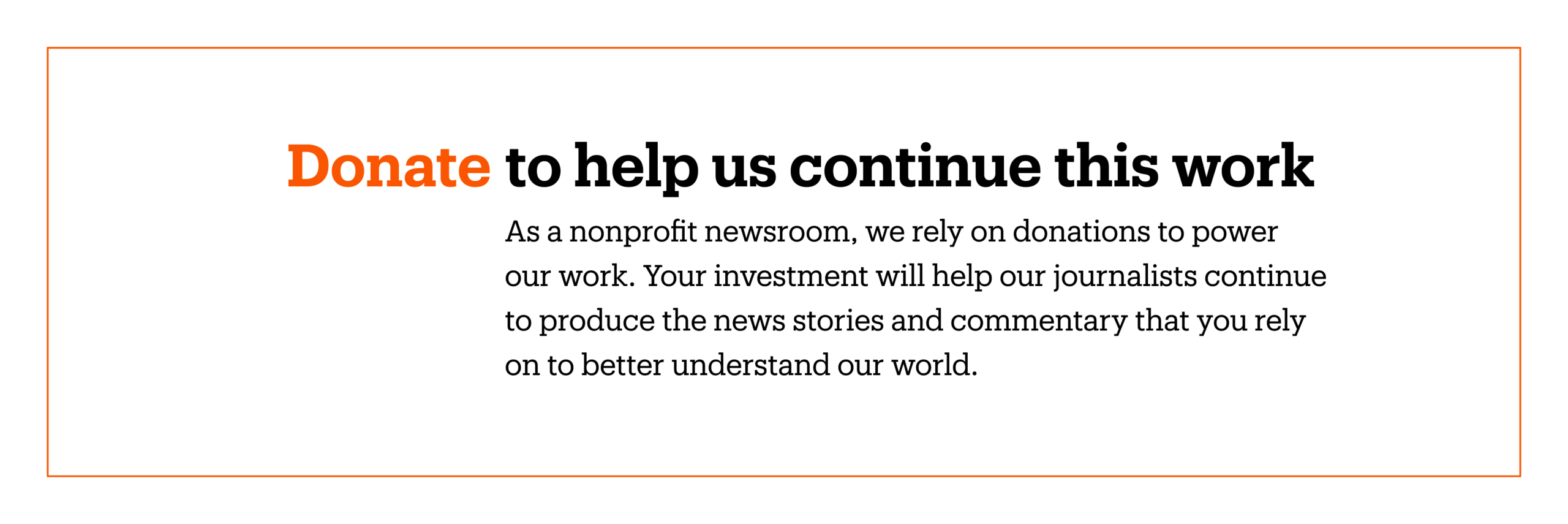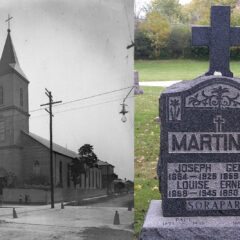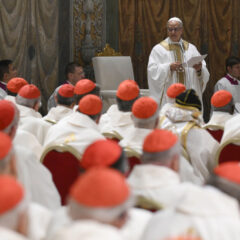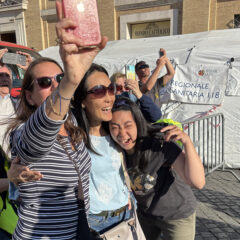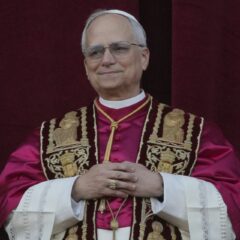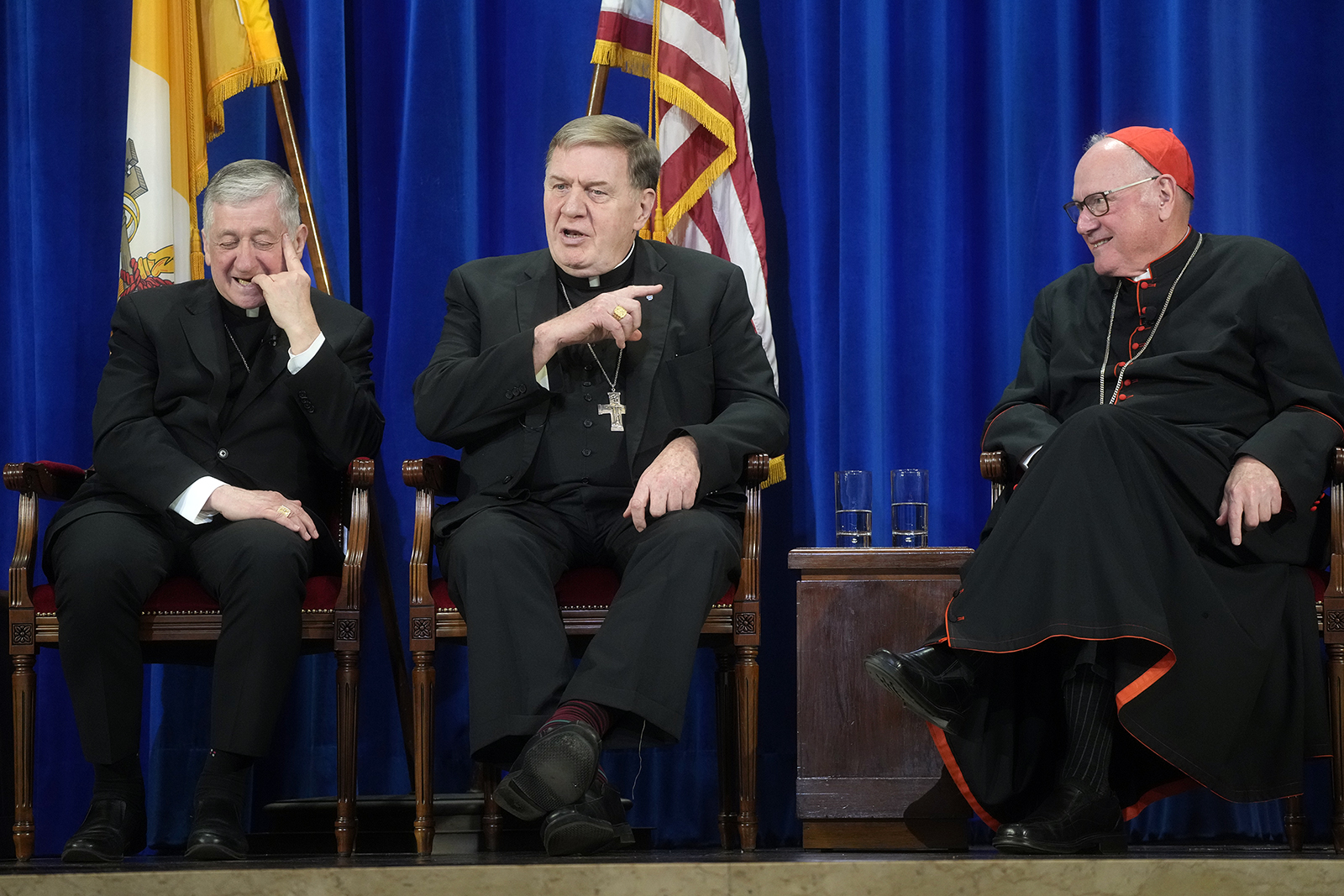
VATICAN CITY (RNS) — Celebrating the election of the first pope from their country, six of the 10 U.S. cardinals who voted in the conclave that elected Pope Leo XIV gathered Friday (May 9) to express their joy and surprise at a press conference at the Pontifical North American College in Rome, where many of them stayed before the historic conclave began.
“ I always thought it would be impossible to have an American pope in my lifetime,” said Cardinal Robert McElroy, archbishop of Washington.
For McElroy’s predecessor, the retired Cardinal Wilton Gregory, the election was more personal. The Chicagoan Gregory, raised not far from the south Chicago suburb where Leo grew up, said he told the new pope, “From one Southsider of Chicago to another, I promise you my respect, my fidelity, and my love,” his voice breaking a bit at the end.
McElroy and New York Cardinal Timothy Dolan agreed that, despite conventional wisdom that largely dismissed the possibility of a U.S. pope, Leo’s U.S. citizenship was not a big factor in the decision. “ I think the impact of him being an American was almost negligible in the deliberations of the conclave. Surprisingly so,” said McElroy.
Dolan dismissed a narrative that Leo’s election was a response to U.S. President Donald Trump’s growing authoritarianism. “I don’t think at all my brother cardinals would have thought it as a counterweight to any one person,” he said, adding that it might be a little more “apt” to call the Polish Pope John Paul II’s 1978 election a response to politics at the time when Communist power was beginning to falter in Poland.
Instead the cardinals emphasized Leo’s missionary history, particularly his extensive time in Peru. McElroy compared Leo to Peter and Paul, both missionaries who came to Rome and “gave their lives” in the city.
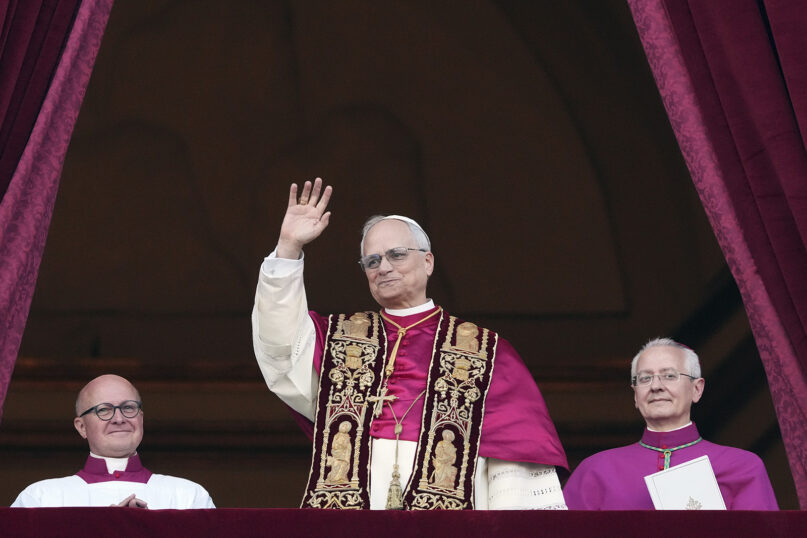
Cardinal Robert Prevost appears on the central loggia of St. Peter’s Basilica after being chosen the 267th pontiff of the Roman Catholic Church, choosing the name of Pope Leo XIV, at the Vatican, Thursday, May 8, 2025. (AP Photo/Alessandra Tarantino)
The cardinals also emphasized the unity and the experience of the Holy Spirit acting through them, with Cardinal Blase Cupich, archbishop of Chicago, remarking on 133 cardinals’ ability to come to a decision within 24 hours, despite the differences in their cultural backgrounds and origin in more than 70 countries.
“If only the rest of us in our lives and the world would have that mad dash to unity that we seemed to have in the conclave,” Cupich said, indicating he thought it possible.
The U.S. apostolic nuncio, French Cardinal Christophe Pierre, who attended the press conference in addition to the U.S. cardinals, said the experience flipped French poet Charles Péguy’s saying that everything begins mystically and ends in politics. “ What I experienced is that everything begins in politics and finishes mystical,” he said.
Cardinals Raymond Leo Burke, James Michael Harvey, Kevin Farrell, who were also U.S. cardinal-electors but reside in Rome, were not at the press conference.
McElroy said the moment they entered the Sistine Chapel, listening to the Litany of the Saints and looking up at the painting of the Last Judgment, “ All sense of those divisions within the world fell away…we were looking at that moment into the souls of one another,” he said.
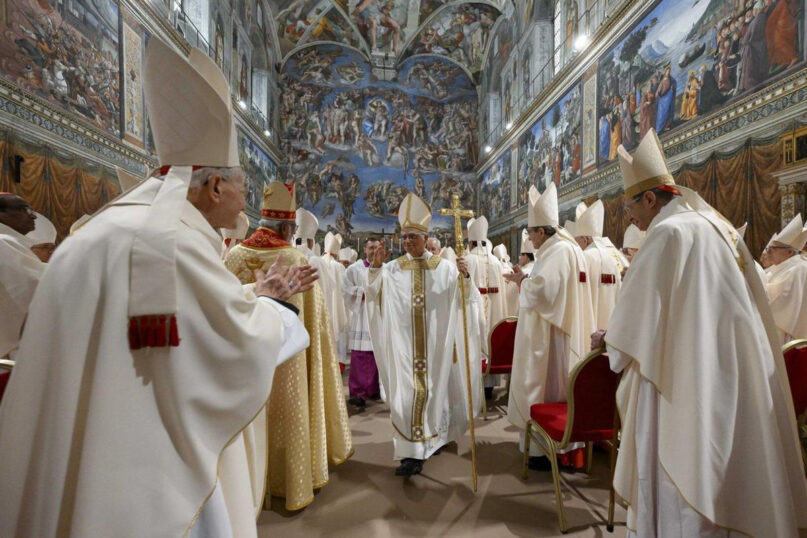
Newly elected Pope Leo XIV, center, leaves after concelebrating Mass with the College of Cardinals inside the Sistine Chapel at the Vatican, the day after his election as 267th pontiff of the Roman Catholic Church, Friday, May 9, 2025. (Vatican Media)
“Voting is like watching a glacier move, but sometimes glaciers under stress move a lot faster,” said Newark, New Jersey, Cardinal Joseph Tobin, who added that the cardinals were counting on the Holy Spirit.
“What an extraordinary experience,” said Pierre.
Five of the seven U.S.-based cardinals were participating in their first conclave, and they spoke about the enormity of what they had just done.
But the cardinals also acknowledged the gravity of the responsibility that was being placed on Leo.
Tobin, who said he had known and worked with “former Cardinal Bob” over the past 30 years, said as he walked back to his seat after casting one of his ballots, he saw Leo with his head in his hands. Leo knew his name had “been floating around,” Tobin said. “I couldn’t imagine what happens to a human being when you’re facing something like that.”
But Tobin, who had been mentioned as a dark-horse papal contender, said, “ When he accepted it, it was like it was made for him, because all of whatever anguish was resolved.”
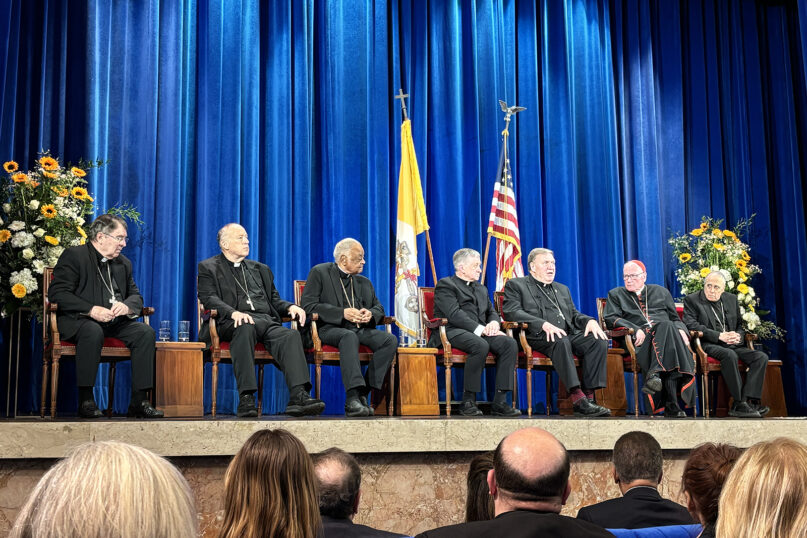
From left, U.S. Cardinals, Christophe Pierre, apostolic nuncio to the USA, Robert McElroy of Washington, Wilton Gregory, archbishop emeritus of Washington, Blase Cupich of Chicago, Joseph Tobin of Newark, Timothy Dolan of NY, and Daniel Di Nardo, archbishop emeritus of Galveston Houston, attend a press conference at the North American College in Rome, Friday, May 9, 2025, one day after U.S. Cardinal Robert Francis Prevost was elected Pope Leo XIV. (RNS photo/Aleja Hertzler-McCain)
The Newark cardinal said the preacher of the papal household, Cardinal Raniero Cantalamessa, who gave the electors one last homily before the election, left them all with advice for whoever was elected. “Be yourself,” said Cantalamessa, according to Tobin, who added his own reflection inspired by C.S. Lewis on the need to be authentic to truly experience closeness with God when recounting the message to journalists.
New York Cardinal Timothy Dolan said his 12-year-old great-nephew, Charlie, who was born the day Pope Francis was elected, had texted him saying that they were cheering and crying for Leo’s election.
“We’re glad you weren’t pope, so you can come home,” Dolan recounted Charlie saying, another reminder of the weight of the papacy. After becoming pope, Francis never returned to Argentina.
Asked what led them to elect Leo, Gregory said that Leo had not offered any particular speech during the general congregations, or pre-conclave meetings, but he had instead “ engaged quite effectively in the smaller group conversations.”
“What was important was not the substance of what he said, but the manner in which he said it,” McElroy added.
Gregory said that, rather than having anything to do with U.S. elections, the cardinals were instead asking, “Who among us can bring us together? Who among us can strengthen the faith and bring the faith to places where it has grown weak?”
Of his longtime friend Leo, Tobin said, “I don’t think he’s one that likes to pick fights, but he is not going to back down if the cause is just.”
As for the inspiration they took from Francis, McElroy mentioned a repeated theme from many speakers at the general congregations leading up to the conclave: “ We’re looking for someone following the pathway of Francis, but we’re not looking for a photocopy.”
Dolan said that he, like many of the cardinals, was looking for someone with extensive pastoral experience, particularly within a parish or diocese. Filipino Cardinal Pablo Virgilio David expressed a similar sentiment to America magazine before the election.
That criteria could have knocked out frontrunner Cardinal Pietro Parolin, a long-serving Vatican diplomat who lacked pastoral experience.
Galveston-Houston Cardinal Daniel DiNardo, who is retired as archbishop, reminded journalists that, despite a long career and missionary history, Leo would have new experiences in the papacy. “Give him space to grow into the office. He’s never been pope before,” he said.

